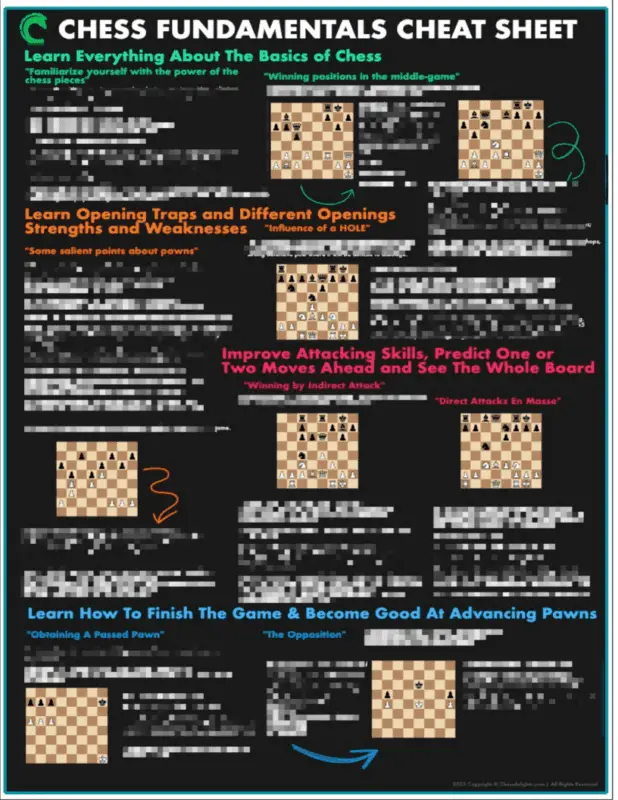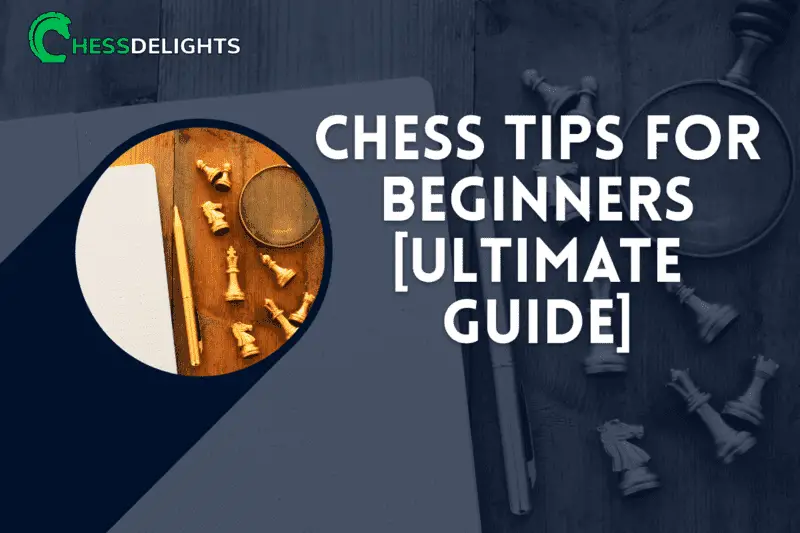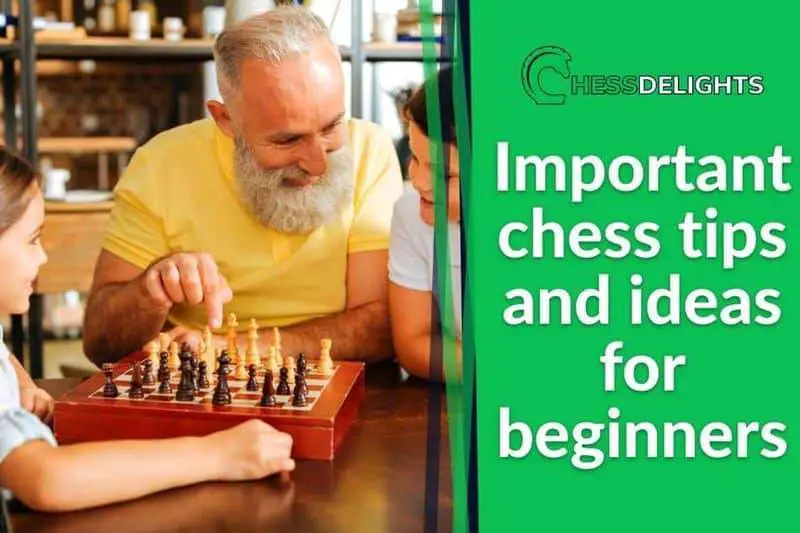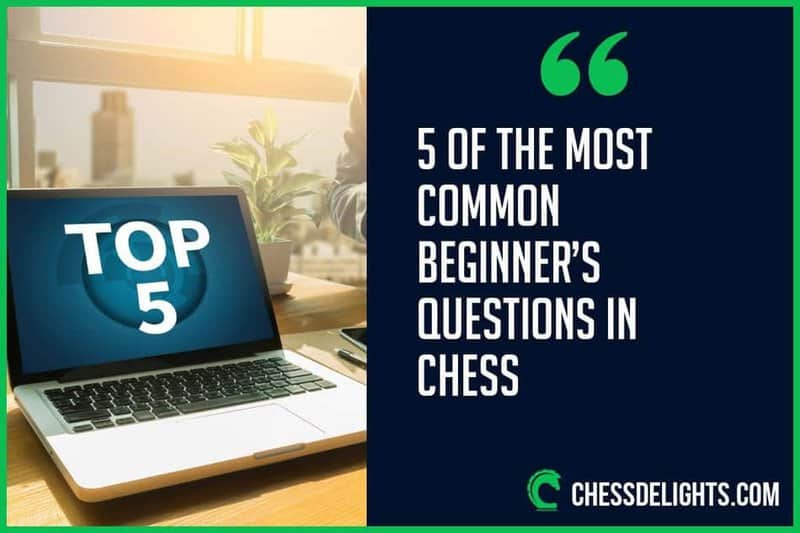If you're a beginner looking for chess advice, you shouldn't settle for mediocre tips such as “learn the moves” or “play to win.”
There are chess tips that can provide you with valuable information and immediately improve your game.
So once again, I researched the Internet and contacted chess experts to find the best chess advice and compile it for your consumption in this article. The majority of these tips are based on my years of experience as both a novice and tournament player.
The most important tip I can share with you today as a beginner is to read The Chess Fundamentals by World Chess Champion J.R Capablanca.
Besides the book, you should really check the 13 chess tips below. 🙂
Always fight for center control
When teaching beginners how to play chess, it is often stressed that they should always fight for center control.
This means that the player should try to keep as much of the board as possible under their control by moving their pieces around to create blocking and attacking positions. Usually, center pawns are very crucial at the opening. If you can control the center, you'll likely have control up to the end of the game and win.
I suggest you should be aggressive and take control of critical areas on the board like the center, and beginners can quickly become competent chess players.
Remove opponent's chess pieces
This is one of the best chess strategies I've adopted, which I learned from a Magnus Carlsen game.
Capturing your opponent's chess pieces is what allows you to attack in the game.
Capturing or exchanging this piece can disrupt your opponent's strategy, opening up opportunities for your own attack or strategy.
You must identify the pieces that can attack you at any time and cause significant problems. You can win if you can eliminate them and continue with your strategy.
Block opponent's moves
I picked up this tip or strategy just by watching the grandmasters' game. It's blocking your opponent's pieces from moving; when you prevent them from moving, you can force the opponent to make mistakes, leading to you effectively implementing your strategy.
Pawns are one of my favorite chess pieces to block my opponent's moves. I especially like to block Bishop's moves by putting my pawn in front of their pawns that block their way.
Blocking allows you to keep your opponent struggling to unblock its pieces and prevents your opponent from advancing their pawns and implementing their strategies. You can control the game's flow by blocking your opponent's moves and ultimately win! 🙂
Position your pieces for success
The best way to win a game of chess is to position your pieces so that they can cause the most damage and play the best moves.
It is important to position your pieces to the best possible position in order to win. Pieces such as the rook, queen, and bishop can move quickly around the board and can help you achieve a winning position. Positioning your pieces correctly will also prevent your opponent from achieving a winning position.
My experience playing through different games and practicing finding good positions, will help you quickly improve as a chess player and win more games.
Don't leave pieces hanging
When playing chess, it is essential always to be aware of what's happening on the board (obviously)…lol!
You have to ensure that you are not leaving your pieces unguarded or hanging, as this can lead to a loss in the game.
The most important piece to guard is, of course, your King, but other pieces that are left hanging or unguarded can lead your opponent to build an advantageous position by taking them. Because hanging pieces also open you to a counterattack, your opponent can use the open space on the board to move their pieces closer to your King.
Always be prepared for any potential moves your opponent may make, and stay focused on the game to win.
Keeping track of pieces
What do I mean by keeping track of pieces? When we begin exchanging chess pieces, we do not usually keep track of how many pieces remain, so it is difficult to determine whether you have a material advantage.
That is why it is important to keep track of both your own and your opponent's pieces. This can be done by simply counting the number of pieces on each side or by keeping a mental note which pieces are blocked by other pieces.
Checking the number of pieces on each side allows you to better assess the potential threats posed by your opponent and ensures that you don't make any moves that can lead to blunders or mistakes. This happens to me a lot. That's why before engaging in any exchanges, you must ensure that you will have a material advantage.
Keeping track of the position of your own and your opponent's pieces also allows you to plan ahead for future moves and win.
Aim to win in exchanges or positions
Just like the above tips, you should always aim to win in exchanges all the time. Sometimes or most of the time you are occasionally tempted to take or capture pieces regardless of whether or not you will win the exchanges.
How do I make sure that I will win in exchanges, I just go through it mentally. I go over it two or three times so that this I will be able to make sure that I have a material advantage.
Or I will have a positional advantage because you can lose the game quickly even if you win the exchanges but are in a positional disadvantage. If you have a checkmate threat (the greatest positional advantage), you are in a winning position.
So, you have to aim for winning exchanges and winning positions.
Aim to simplify the game
Since you have achieved a material advantage already, hopefully, you are in an excellent positional advantage. The next step is to aim to simplify the game.
What do I mean by simplifying the game? You have to reduce the number of pieces on the board, making your winning much easier. You can exchange pieces that can lead to your opponent having no minor pieces and ideally having a King versus your King plus another minor piece (like a rook, bishop, or queen).
Learning to simplify the game, especially in the endgame, will help you win more games!
Study 3 chess traps
As a beginner chess player, one of the most entertaining activities is to study chess traps. It is a game aspect that everyone enjoys learning and implementing. This is one of my favorite things of chess, especially if the trap can be successfully exploited.
I recommend studying three chess traps for the openings you are currently studying or for a common opening! This will increase your chances of winning a game.
Study 5 checkmates patterns
Following the study of three chess traps, you should examine five checkmate patterns. Why is it necessary to learn checkmate patterns? So that you know what to do if you encounter them in a live or online game. 🙂
It is frustrating not to recognize checkmate patterns, especially when playing with a timer. If you don't know how to execute a checkmate, you will most likely lose.
I recommend that you review the five most frequent checkmate patterns you encounter daily. Then, examine another 5 patterns of another checkmate and attempt to incorporate them into a game.
This will help you win more games.
Take advantage of pinnings
Pin your opponent's pieces, though most pins are easy to defend, particularly in the opening game. The majority of the time, however, your opponent will struggle to remove the pin, forcing them to make mistakes.
You must maximize the benefits of pins; ensure that there are more advantages than disadvantages.
I enjoy pinning knights with the bishop because I can prevent the knight from reaching advantageous positions or capture the knight to disrupt my opponent's strategies and win the game.
Study King's pawn opening
The King's pawn opening move is the most common chess opening in the game. So, as a beginner, you should learn how to play the king's pawn opening and defend against it.
Learn as much as you can about this opening move to gain an advantage, and you can easily win when you are playing with or against this opening.
You can also check this article about king's gambit opening
Study London system chess opening
Now that you are familiar with King's pawn opening, you should also learn about another chess opening that is considered one of the universal chess openings today!
The London system chess opening can be used to play virtually with any color, and also it's an opening move that you can play against any opening move your opponent makes.
I suggest you learn this opening as beginner and study as much as you can about this opening.
You can also read this tutorial about London system chess.
Wrapping Up
There you have it, useful chess tips that will help you win more games.
It is clear that one of the most important aspects of chess for beginners is to simplify the game as much as possible. This can be done in a number of ways, but a few key points to remember are:
- Focus on the essential principles of chess, such as capturing pieces, moving your pieces, and developing your strategy.
- Don't overthink your moves or become bogged down in details. Just make sensible decisions based on what you know about the game.
- Always keep an eye on the overall situation and how your opponents are playing in order to make better decisions.
By following these tips for beginners, you'll be able to stay ahead of your opponents and keep your chess game winning! You can also check this page for more chess tips!





